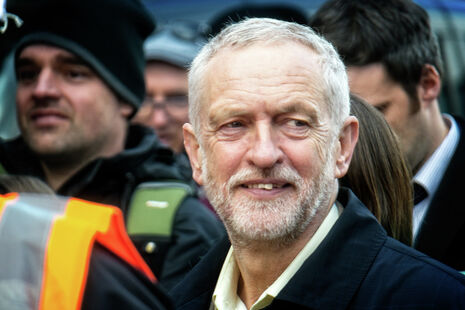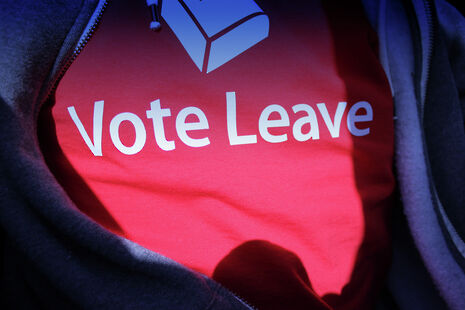Not so black and white: Labour and the working class
‘Northern’ or ‘working-class’ does not equal ‘white’, argues columnist Nandini Mitra

To say the Labour Party is divided would be an understatement. he events of this last summer, culminating in Jeremy Corbyn’s re-election as Labour leader this September, were both the cause and result of the schisms fracturing the party. However, these cracks extend beyond the benches in the Commons: they exist between members of the Labour Party, and Labour voters, as a whole. With increasing frequency and forcefulness, the rhetoric of some of the members of the parliamentary party threatens to widen these fractures between members further, endangering not just our electoral chances but the viability of the party as a whole for what we know it to be: inclusive, progressive, and the champion of equality.
Rachel Reeves commented recently that the UK “could explode” in violence should the government choose not to abandon freedom of movement in Brexit negotiations. This was done in her faith that Labour ought to listen to its supporters, and in particular those who comprise the party’s traditional cornerstone of support. These are voters in the North of England who for decades now have borne some of the greatest economic burden of increasing globalisation dating back to the 1980s, and the austerity agenda which has been pursued since 2010. They are the voters who largely voted for Britain to leave the EU in June as an anti-establishment middle finger to the current order – 58 per cent of the North East voted for Brexit, with Newcastle the only counting area that voted Remain by a one per cent majority. Similarly, the Leave campaign won 53.7 per cent of the vote in the North West. The reasons for their disillusionment are neither unfamiliar nor unreasonable: the North has lacked the substantial infrastructural investment that cities, towns and industries need in order to provide the better jobs, education and facilities that are disproportionately concentrated in the South East. Where there are jobs, workers are often exploited, such as those employed at the ASOS warehouse in Barnsley, and where there are facilities, they are lacking the development needed to make them truly functional. Given that these areas comprise Labour’s historic heartlands, the problems these voters face are legitimate issues that the Labour Party should address, so it is understandable that Labour politicians are keen to reach out and reconnect with voters who now view the party as out of touch with some of its members.
However, to espouse the North-South divide narrative as Labour continues to do so is both intellectually disingenuous and harmful to its electoral prospects. While no Labour member can doubt the importance of winning back the voters in Northern England, to continue positing this false binary in which the South is immeasurably better than the North ignores the similar problems caused by de-industrialisation and lack of investment that is felt in areas of the South West, Wales and the Midlands – steelworkers at the Tata plant in Port Talbot still face uncertainty over their job prospects following Tata’s announcement of the closure of its British plants back in March. Additionally, viewing Labour’s support through this geographical binary ignores another cornerstone of Labour support which has been undermined by analysis that often presents it as against the interests of those in traditional Labour heartlands: immigrants. Besides the fact that the du jour practice of pitting the ‘immigration problem’ as a means of winning back Northern voters essentially assumes Northern’ to be incompatible with ‘immigrant’ (like Bradford doesn’t exist), it risks alienating immigrants who have also traditionally voted for Labour and who are now blamed for problems they themselves face.

Rachel Reeves’ incendiary comment is not the way the Labour Party should be seeking to rebuild support in the North of England, nor does it do anything to cement the fragile hold it has over members now. Rather, the sentiment behind her statement – inaccurate anyway, as she compared the riots of 2011 which started with the police shooting of Mark Duggan to possible riots in the future over immigration concerns – continues a false and dangerous narrative that immigrants are to blame for the economic and social issues facing Britain. Perpetuating this sentiment so strongly – as Chuka Umunna has done so in expressing his willingness for Britain to leave the Single Market in favour of curbing immigration – does not provide the material solutions to the problems caused by austerity measures. Rather, it tells certain Labour voters that their support is not valued by the party – one which appears increasingly willing to sacrifice such support in hopes of winning back other voters. Considering that 52 per cent of the three-million-strong BME electorate voted for Labour in 2015, compared to the 33 per cent share the Conservatives won, it seems hardly wise to be so dismissive of such a strong electoral base. Although there are disparities between average household incomes for different ethnic groups, overall, ethnic minorities are twice as likely as white people to be in income poverty, with the New Policy Institute measuring the rate to be at 40 per cent. BME people in the UK need a Labour government just as much as those in the deindustrialised heartlands.
Additionally, more than half of black African, black Caribbean and Bangladeshi households are in London. The deprivation of inner-city London is another testament to the dangers of oversimplification found in the familiar North-South divide narrative as it overlooks not only where the effects of austerity are felt, but also by whom and how. To concentrate all of Labour’s energy on one electoral base while simultaneously alienating another will not result in a total increase of united support. Rather, to continue treating them as disparate entities risks a fracturing that will ultimately cost the united front Labour needs – the effects of which have already been seen in the last year alone.
According to research by the think tank British Future, the Conservative victory in the 2015 General Election is partially attributable towards the widening of their appeal to BME voters; the party secured a million BME votes for the first time in its history, helping it clinch the majority it needed to govern. A breakdown of these results further illuminates voter behaviour, and why party rhetoric is so important. Support for the Conservatives was higher among Asian voters compared with mixed-race and black voters at 38 per cent. A breakdown by religion reveals that Hindus and Sikhs were both 49 per cent more likely to vote Tory than Labour. These results suggest that the model-minority complex surrounding British Indians especially manifests itself electorally. Those whose immigration dates back decades are increasingly viewing themselves as having ‘assimilated properly’ and so wish to avoid being viewed in a similar light to the groups comprising new waves of immigration that have been met with such vitriol: Eastern Europeans.
The Brexit vote provides one such example of this behaviour being reflected in the polls: except for London, almost every constituency with a sizeable South Asian population voted Leave. The practice of scapegoating in post-factual politics has resulted in this distancing between different minority groups, and is the cause of the tension between Labour’s Northern heartlands and its BME voter base. Nobody appreciates being blamed for things they did not do. Labour would do well to remember that before the practices of MPs such as Reeves and Umunna cause great harm to Labour’s base of support.
While research does suggest that voters care less for material solutions to the problems caused by austerity than they do about immigration – apparently, the notions of class and identity are of greater concern – this view fails to draw connections between economics and identity. Part of the reason why the NHS inspires such sentimental reactions is because of the fundamental principle of equality which lies at its foundation: since 1948, no matter one’s economic standing, one is entitled to free healthcare at point of use. And if identity is so important, and as such, one were to consider what constitutes a ‘British’ identity, the NHS and the principles it was founded on would surely count as an institution which inspires a communitarian sense of pride. Rather than taking the lazy – and perhaps not hugely successful – route of winning back some support by blaming immigration, Labour MPs should be challenging the existing narrative of scapegoating and shifting it to foster the same sense of communitarian inclusiveness that the NHS was founded upon. Given the current political climate, this task is not easy. But by addressing the individual issues facing voters for what they are – austerity, not immigration – Labour will appear to be a genuine party of the people: one that is responsive to and reflective of the heterogeneity of Britain
 Features / How sweet is the en-suite deal?13 January 2026
Features / How sweet is the en-suite deal?13 January 2026 Comment / Will the town and gown divide ever truly be resolved?12 January 2026
Comment / Will the town and gown divide ever truly be resolved?12 January 2026 News / 20 vet organisations sign letter backing Cam vet course13 January 2026
News / 20 vet organisations sign letter backing Cam vet course13 January 2026 Arts / Fact-checking R.F. Kuang’s Katabasis13 January 2026
Arts / Fact-checking R.F. Kuang’s Katabasis13 January 2026 Music / Inside Radiohead’s circle13 January 2026
Music / Inside Radiohead’s circle13 January 2026









